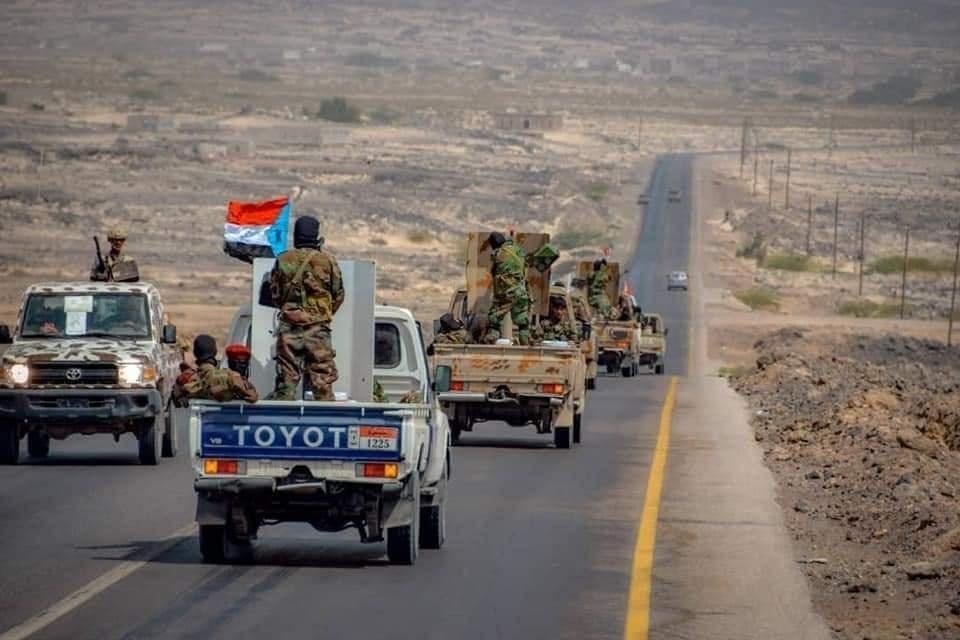
Southern Forces (file photo: local media)
آخر تحديث في: 18-08-2022 الساعة 2 مساءً بتوقيت عدن
Ibrahim Ali* (South24)
The latest incidents in the Southern governorate of Shabwa may put an end to the Islah Party’s clout in the oil-rich governorate forever. However, this raised questions about the future of the war against terrorism in Shabwa which has been for years one of the most important AQAP’s bastions.
Over past months, AQAP carried out a number of operations in the governorate against Shabwa Defense Forces affiliated with the STC though it has not officially claimed its responsibility.
The AQAP’s attacks could be understood as being a reaction towards the decline of the Islah Party’s influence in the governorate after deposing former Governor Mohammed Saleh Bin Adyo and the appointment of the tribal sheikh Awad Bin Alwazir Al-Awlaki as his successor. Additionally, this came in the wake of the return of Shabwa Defense Forces (formerly known as Shabwani Elite) to the governorate after 3 years of absence due to the 2019 incidents.
Security sources told “South24” that “the AQAP’s attacks against Shabwa Defense in the capital city of Ataq were carried out through a collusion by the Special Forces affiliated with the Islamic Islah Party. They played a main role in the latest battles in Ataq".
Close relationship
Despite sacking Bin Adyo, whose era witnessed a boost in the AQAP’s activities, the Special Forces and other military formations affiliated with the Islah Party have blocked the road of counterterrorism efforts.
These forces remained outside the AQAP’s targets over past years. The AQAP is well aware that these forces are essentially subjected to the party’s decisions. For example, two months after the return of Shabwa Defense Forces, the AQAP launched more than a bloody attack against them in more than one area in the governorate.
Being exempted from attacks is not the only proof of a strong relationship between the AQAP and the forces affiliated with the Islah Party in Shabwa. AQAP recently indicated that such forces are not among its targets and it indirectly apologized to Abyan Axis Forces due to an operation carried out by its militants. It described the operation as an individual behavior.
The AQAP always talks about STC and UAE as being their main enemies in Yemen. The same thing can be observed in Islah's directed media discourse. However, the scope of this relationship is not limited to the point of a joint enemy but there is a remarkable mental and ideological harmony between them. The AQAP earlier announced that it fought along with the religious groups based upon doctrinal and sectarian motives.[1] Thus, it is apparently hard to talk about a war against terrorism in the governorate while there are forces who have close relationships with AQAP. It is hard to deal with these forces as if they are regular and governmental ones. This is although the Islah party describes them as “army and security" forces while calling the other side as “militias".
In light of this possible relationship between military formations affiliated with the Islah Party and the AQAP, many ask about the future of the war against terrorism in the governorate after driving out these formations. In this regard, one can talk about two matters, the first of which is the "terrorism" activities while the second is the war against terrorism.
Terrorism activities
The AQAP may be keen on implementing retaliation operations against Shabwa Defense Forces and Southern Giants Brigades because of their role during the latest battles in Shabwa. The recent attacks, believed to have been carried out by AQAP, in May, Juni and August came as part of such a retaliatory context.
AQAP looks at these forces affiliated with the STC as a target. The organization had a bitter experience with them between 2016 and 2018. This means that AQAP realizes that clearing Shabwa's hideouts will be among the priorities of the new authorities.
It is important to note that any AQAP attacks are considered an expected reaction towards the loss of the safe stronghold. This doesn’t necessarily denote security weakness.
Counterterrorism
In this axis, one can talk about a previous experience and current different situation regarding counterterrorism. During 2017-2018, the Shabwani Elite Forces, backed by the Arab Coalition, managed to expel AQAP completely after military and security operations as well as community synergy. Unlike the previous operations, the "Elite" operations didn't stir the sensitivity of the governorate's tribes who refused the entry of regular forces whose members mostly belong to Northern provinces. It can be said that establishing regular forces that wholly consist of Shabwa people treated the most important problems regarding the war against terrorism.
The current situation constitutes a typical status for the success of counterterrorism efforts as the governorate has no pro AQAP security incubator. Moreover, there is no presence of the Houthis who had controlled three important districts in Shabwa (Beihan, Usailan and Ain) before being driven out.
The most important is that the Abyan governorate which borders Shabwa won't be a starting point for AQAP attacks like before. The control held by Shabwa Defense Forces and the Giants Brigades over Shabwa along with the collapse of the Islah forces there meant an implicit control on other areas in Abyan which had served as a safe haven for AQAP.
Since Wadi Hadramout, which is located in the east of Shabwa, constituted one of the most important AQAP bastion, the future of the war against terrorism in Abyan and Shabwa is closely connected with the situation there. The full success in the war against terrorism requires expanding these efforts to include Hadramout.
It can be said that the latest military operation in Ataq was the most important one in the war against terrorism. The next operations against the AQAP won't be out of this context but it will be less sharp for the aforementioned reasons.